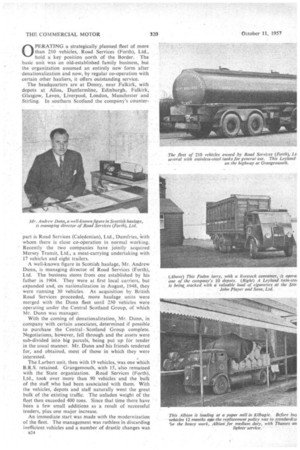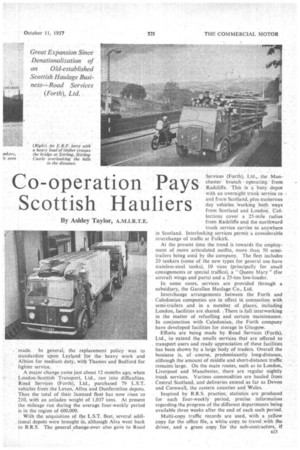• O PERATING a strategically planned fleet of more
Page 58

Page 59

If you've noticed an error in this article please click here to report it so we can fix it.
than 210 vehicles, .Road Services (Forth), Ltd., hold a key position north of the Border. The basic unit was an old-established family business, but the organization assumed an entirely new form after denationalization and now, by regular co-operation with certain other hauliers, it offers outstanding service. The headquarters are at Denny, near Falkirk, with depots at Alloa, Dunfermline, Edinburgh, Falkirk, Glasgow, Leven, Liverpool, London, Manchester and Stirling. In southern Scotland the company's counter part is Road Services (Caledonian), Ltd., Dumfries, With whom there is close co-OPeration in normal working. Recently the two companies have jointly acquired Mersey Transit, Ltd., a meat-carrying undertaking with 17 vehicles and eight trailers.
A well-known figure in Scottish haulage, Mr. Andrew Dunn, is managing director of Road Services (Forth), Ltd. The business stems from one established by his father in 1904. They were at first local carriers, but expanded and, on nationalization in August, 1948, they were running 30 vehicles. As acquisition by British Road Services proceeded, more haulage_ units were merged with the Dunn fleet until 250 vehicles were operating under the Central Scotland Group, of which Mr. Dunn was manager.
With the coming of denationalization,. Mr. Dunn, in company with certain associates, determined if possible to purchase the CentralScotland Group complete. Negotiations, however, fell through and the assets were sub-divided into big parcels, being put up for tender in the usual manner. Mr. Dunn and his friends tendered for, and obtained, most of those in which they were interested.
The Larbert unit, then with 19 vehicles, was one which B.R.S. retained. Grangemouth, with 15, also remained with the State organization. Road Services (Forth), Ltd., took over more than 90 vehicles and the bulk of the staff,who had been associated with them. With the vehicles, depots and staff naturally went the great bulk of the wasting traffic. The unladen weight of the fleet then exceeded 400 tons. Since that time there have been a few small additions as a result of successful tenders, plus one major increase.
An immediate start was made with the modernization of the fleet. The management was ruthless in discarding inefficient vehicles and a number of drastic changes was • made. In general, the replacement policy was to standardize upon Leyland for the heavy work and Albion for medium duty, with Thames and Bedford for lighter service.
• A major change came just about 12 months ago, when London-Scottish Transport, Ltd., ran into difficulties. Road Services (Forth), Ltd., purchased 79 L.S.T. vehicles from the Leven;Alloa and Dunfermline depots. Thus the total of their licensed fleet has now risen to 210, with an unladen weight of 1,037 tons. At present the mileage run during the average four-weekly period is in the region of 600,000.
With the acquisition of the L.S.T. fleet, several additional depots were brought in, although Alva went back to B.R.S. The general schange-over also gave to Road




















































































































